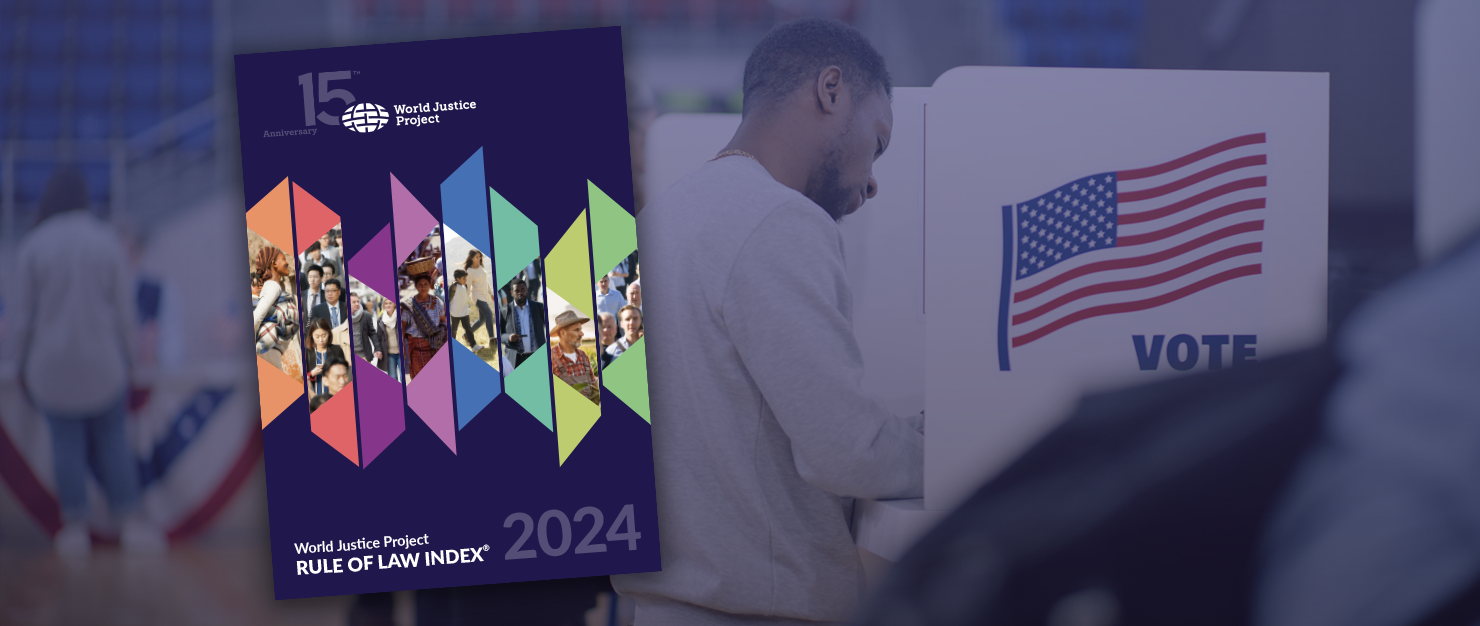


FOR IMMEDIATE RELEASE
MEDIA CONTACT: [email protected]
WASHINGTON (Oct. 23, 2024) – The United States has dropped six places in a global ranking for “lawful transition of power.”
Released today, the annual World Justice Project (WJP) Rule of Law Index® evaluates a wide variety of rule of law indicators in 142 countries and jurisdictions. Two weeks out from the 2024 election, the U.S. ranking on the Index sub-factor that measures confidence in elections has dropped from 37th to 43rd globally.
On overall rule of law, the U.S. score declined slightly in 2024, but the country maintained its previous global ranking of 26 out of 142. That performance puts the United States in the bottom half of high-income countries around the world.
The rule of law recession continues
Since 2016, the United States, like much of the world, has been mired in a rule of law recession. Constraints on U.S. government powers have eroded significantly in that time, according to the WJP Rule of Law Index. The ability of Congress, the courts, the media, and civil society to check executive power have all declined.
“In a democratic society, elections are the most important check on government power that citizens can exercise,” said Elizabeth Andersen, executive director of the World Justice Project.
“Falling confidence in U.S. elections further undercuts Americans’ trust in institutions, government accountability, and the rule of law.”
An authoritative source
Now in its 15th edition and covering 95% of the world’s population, the WJP Rule of Law Index is the world’s leading source for original, independent rule of law data. The United Nations, World Bank, governments, investors, and civil society advocates use the Index to assess risk, shape reforms, and track rule of law trends.
The Index’s rigorous methodology draws on in-depth surveys with experts as well as nationally representative household polls to assess 8 factors and 44 sub-factors of the rule of law.
Many U.S. voters prepared to reject election results
Earlier this fall, WJP released a separate study based on the household poll that partially informs the 2024 Index. “U.S. Rule of Law Trends and the 2024 Election” identified falling and polarized citizen confidence in elections, as well as the courts that may ultimately decide them.
The study found only half of Americans trust election officials (34% of Republicans and 67% of Democrats). Additionally, 1 in 3 Americans are prepared to reject presidential election results. Close to half of Republicans (46%) and over a quarter of Democrats (27%) said they would not accept election results as legitimate if the other party’s candidate won. In this scenario, 14% of Republicans and 10% of Democrats said they would take unspecified action to overturn results.
Experts surveyed for the 2024 Index tend to have more confidence in the U.S. electoral system than the average citizen, and there is little evidence to substantiate many voter concerns. While the current Index score for “lawful transition of power” remains 12% lower than in 2016, it is higher today than at its 2020 low point ahead of the previous presidential election.
Elections and the courts
“These findings underscore the critical nature of efforts to build public trust in electoral systems, which are actually functioning quite strongly,” WJP’s Andersen said. “More than 60 lawsuits after the 2020 election found no evidence of fraud or erroneous results.”
However, Americans’ falling trust in courts presents another challenge. If the fate of the 2024 presidential election is determined by the Supreme Court, WJP polling finds that 41% of Republicans and 40% of Democrats would not consider the result to be legitimate if the other party won. In that scenario, 13% of Republicans and 15% of Democrats said they would take unspecified action to overturn results.
A new rule of law tool for voters
On a more hopeful note, 96% of both Republicans and Democrats say the rule of law is essential or important to the future of the country. To empower voters to consider rule of law at the ballot box, the World Justice Project has created a Rule of Law Candidate Scorecard.
“We encourage all Americans to exercise their right to vote and to seek out factual information about the process,” Andersen said. “Participating in elections strengthens democracy and reinforces the rule of law.”
###
For interviews and information: [email protected]
About the World Justice Project
The World Justice Project (WJP) is an independent, nonpartisan, multidisciplinary organization working to create knowledge, build awareness, and stimulate action to advance the rule of law worldwide. WJP’s rigorous data and research include its flagship World Justice Project Rule of Law Index®, the world’s leading, independent source for original rule of law data.
Effective rule of law reduces corruption, combats poverty and disease, and protects people from injustices large and small. It underpins development, accountable government, and respect for fundamental rights, and it is the foundation for healthy communities of justice, health, opportunity, and peace.
The World Justice Project defines the rule of law as a durable system of laws, institutions, norms, and community commitment that delivers accountability, just laws, open government, and accessible justice. Learn more at worldjusticeproject.org.